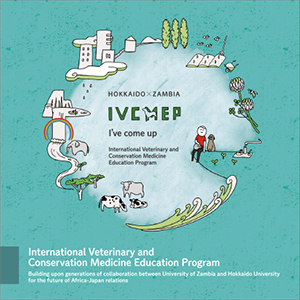About
 Conservation medicine is a new academic field that has spread rapidly around the world since 2000. Environmental changes caused by human activities and the health problems caused by infectious diseases and pollutants are issues that need to be solved worldwide. Conservation medicine is based on the concept of One Health, which considers “health” to be the health of humans, animals, ecosystems, society, and the entire planet. To promote conservation medicine, it is necessary to encourage cooperation between various fields, including medicine, ecology, veterinary medicine, engineering, agriculture, economics, earth science, informatics, literature, and anthropology. These fields are interdisciplinary and diverse, transcending the boundaries between humanities and sciences.
Conservation medicine is a new academic field that has spread rapidly around the world since 2000. Environmental changes caused by human activities and the health problems caused by infectious diseases and pollutants are issues that need to be solved worldwide. Conservation medicine is based on the concept of One Health, which considers “health” to be the health of humans, animals, ecosystems, society, and the entire planet. To promote conservation medicine, it is necessary to encourage cooperation between various fields, including medicine, ecology, veterinary medicine, engineering, agriculture, economics, earth science, informatics, literature, and anthropology. These fields are interdisciplinary and diverse, transcending the boundaries between humanities and sciences.
Under the “Inter-University Exchange Project by MEXT,” Hokkaido University will implement an international educational exchange program for graduate students interested in international conservation medicine. The program will be conducted with the University of Zambia, which has a history of about 40 years of exchange with Hokkaido University. Japanese students, in an environment different from home, will acquire the foundation needed for tackling global issues through on site practical in Africa. Students from the University of Zambia who come to study in Japan will gain access to Japanese laboratories and be exposed to cutting-edge research in conservation medicine.
Programme Policy
◇Develop human resources who understand the social, lifestyle, and cultural differences between Zambia, the sub-Saharan region, and African countries so we can work together. This can be achieved through study experience in Zambia and exchange with faculty, staff, and students of the University of Zambia.
◇Cultivate human resources who are willing to work with Africa in the future based on the awareness that promoting cooperation between Africa and Japan will contribute to solving global problems of infectious diseases, the environment, and food production.
◇To foster human resources who not only have excellent knowledge and skills in their specialized fields, but who also have an international outlook, can actively collaborate with people from different fields, and can contribute to One Health by looking at international issues from a broad perspective.
◇To develop human resources who can communicate with veterinary universities, research institutes, government agencies, hospitals, and companies not only in Japan but also in other countries from an international perspective in areas such as control of infectious diseases, environmental preservation, and assurance of food safety.
The brochure for ICVMEP can be downloaded here.




